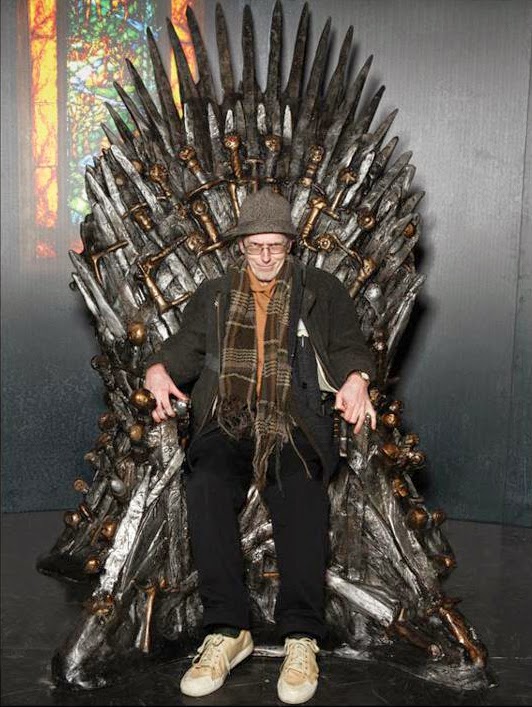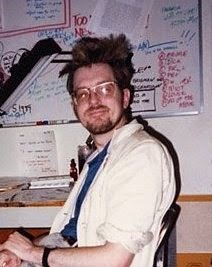The first comic jobs I became aware, to no surprise, were those of the creators themselves: writers, artists, inkers, etc. Their names were creditted in pretty much every book, so naturally those jobs were essentially presented to me in every issue. After that, I think I realized--through commentary in the letters and editorial pages--that the larger companies also employed people who didn't work on the comics, but kept the business moving. Secretaries, traffic managers, HR people, lawyers, etc. (Obviously, this didn't apply as readily to smaller companies, but I was mostly looking at Marvel and DC at that time.)
I don't recall when it dawned on me that there were people writing for comics magazines like Heroes Illustrated or Comics Scene but I somehow understood that they were mostly freelancers, getting paid for one-off articles as they submitted them. And that they probably contributed to any number of magazines and newspapers. I suppose I must have understood something about journalism already, so the notion that they would be freelancers made a kind of obvious sense.
The first job time I recall hearing about a full-time comics gig that wasn't directly making comics or keeping the business running was Peter Sanderson's position as Marvel's archivist. I didn't understand what that meant in terms of day-to-day duties, but I generally understood it to be a sort of librarian-slash-researcher focused exclusively on Marvel. Despite my previous understanding of freelancing, I think I must have gotten it into my head that the comics industry had gotten to a point where you could be a full-time do-er of comics stuff without actually making comics.
This weekend, I talked with any number of people in various aspects of the comic industry. People who made comics and tabled at shows, people who wrote or vlogged about comics, people who were strong advocates for diversity and equality in comics... and the vast majority of them expressly noted that comics were not their day job. That they held a regular gig of some kind that they used to pay the bills, and any comics stuff that they did was distinctly on the side.
It's only been the past few years where I've seen open acknowledgement more-or-less across the board that, in order to do that thing you love, it has to be supplemented by something that provides a steady paycheck. That's not to say you have to have a regular 9-to-5 gig in order to make comics, but just that comics alone don't seem to provide many people with enough income to live on. So even if you're working on a high-profile book like Superman you might also have to write some freelance ad copy for United Airlines' in-flight magazines.
There's nothing wrong with that, of course, but it's striking to me in the relatively recent openness of that conversation. I met a number of new people at C2E2 this past weekend, and many of those conversations included these two questions: what comics/pop culture group were you affiliated with, and what was your day job.
"I do videos for Geek & Sundry, but that's when I'm not working for RedEye."
"I've written several books and give talks like this one, but only when I'm doing marketing work at an ad agency."
"I'm the organizer and promoter for Geek Fest, when I'm not writing code for IBM."
I heard this type of refrain over and over again this weekend from people at all levels of comicdom. From people just getting into it to veterans of several decades. It's clearly not impossible to make a living exclusively from comics, but I don't think the percentage of people who do compared to the percentage that "moonlight" in some other job(s) is that large. I don't know that ten, maybe even as little as five, years ago that this was discussed much, if at all. But given some of the frustration I know I used to feel in not seeing/finding more opportunities to make it exclsuively as a comics professional, it's a topic that I hope others are able to interalize and make it easier to move forward.
Now Available!
Blog Archive
-
▼
2015
(253)
-
▼
April
(21)
- On -isms: Con Haul
- Weekly Comics Links
- On History: Leroy Lettering
- On Business: Freelance Nation
- On Strips: Non-Con
- On -isms: "For Girls"
- Weekly Comics Links
- On History: John Byrne's Unused FF
- On Business: View of Japan
- On Strips: Pre-Star Wars
- On -isms: Herb Trimpe & Ageism
- Weekly Comics Links
- On History: Steranko Histories
- On Business: Marts & AfterShock
- On Strips: Stephen Bentley?
- On -isms: Congrats, Kylie Wu!
- Weekly Comics Links
- On History: Batman
- On Strips: Dateline: Danger!
- On -isms: The Guest List
- Weekly Comics Links
-
▼
April
(21)








2 comments:
I'm reminded of what Mark Evanier has written about people who approach him with their ambition to voice cartoons. His response is that this is not a career; "voice acting" is a career, but encompasses a lot more than cartoons. Determining that you're only going to voice cartoons, he advises, is not remotely practical.
There's also a conversation, near here, about why it should be necessary to have a "real job" and what that even means, in an age when so far as I can discern a whole lot of "real jobs" are just busywork… But that's probably not a conversation for a comment, on a post with no direct connection, on a Monday morning.
I've got an increasingly long, rambling post that's been sitting in draft mode for months about jobs, the economy, class divisions, and everything that touches on that. I doubt I'll ever actually be able to make it coherent enough to post, but that's all simmering in the background here.
Post a Comment